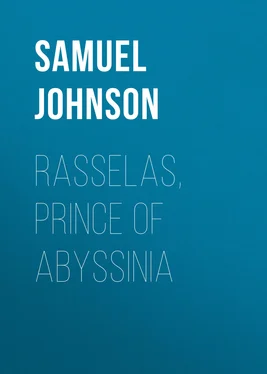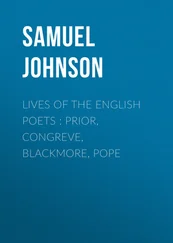Samuel Johnson - Rasselas, Prince of Abyssinia
Здесь есть возможность читать онлайн «Samuel Johnson - Rasselas, Prince of Abyssinia» — ознакомительный отрывок электронной книги совершенно бесплатно, а после прочтения отрывка купить полную версию. В некоторых случаях можно слушать аудио, скачать через торрент в формате fb2 и присутствует краткое содержание. Жанр: foreign_humor, Юмористические книги, literature_18, foreign_antique, на английском языке. Описание произведения, (предисловие) а так же отзывы посетителей доступны на портале библиотеки ЛибКат.
- Название:Rasselas, Prince of Abyssinia
- Автор:
- Жанр:
- Год:неизвестен
- ISBN:нет данных
- Рейтинг книги:3 / 5. Голосов: 1
-
Избранное:Добавить в избранное
- Отзывы:
-
Ваша оценка:
- 60
- 1
- 2
- 3
- 4
- 5
Rasselas, Prince of Abyssinia: краткое содержание, описание и аннотация
Предлагаем к чтению аннотацию, описание, краткое содержание или предисловие (зависит от того, что написал сам автор книги «Rasselas, Prince of Abyssinia»). Если вы не нашли необходимую информацию о книге — напишите в комментариях, мы постараемся отыскать её.
Rasselas, Prince of Abyssinia — читать онлайн ознакомительный отрывок
Ниже представлен текст книги, разбитый по страницам. Система сохранения места последней прочитанной страницы, позволяет с удобством читать онлайн бесплатно книгу «Rasselas, Prince of Abyssinia», без необходимости каждый раз заново искать на чём Вы остановились. Поставьте закладку, и сможете в любой момент перейти на страницу, на которой закончили чтение.
Интервал:
Закладка:
The old man, thus encouraged, began to lament the change which had been lately observed in the Prince, and to inquire why he so often retired from the pleasures of the palace to loneliness and silence. “I fly from pleasure,” said the Prince, “because pleasure has ceased to please: I am lonely because I am miserable, and am unwilling to cloud with my presence the happiness of others.” “You, sir,” said the sage, “are the first who has complained of misery in the Happy Valley. I hope to convince you that your complaints have no real cause. You are here in full possession of all the Emperor of Abyssinia can bestow; here is neither labour to be endured nor danger to be dreaded, yet here is all that labour or danger can procure or purchase. Look round and tell me which of your wants is without supply: if you want nothing, how are you unhappy?”
“That I want nothing,” said the Prince, “or that I know not what I want, is the cause of my complaint: if I had any known want, I should have a certain wish; that wish would excite endeavour, and I should not then repine to see the sun move so slowly towards the western mountains, or to lament when the day breaks, and sleep will no longer hide me from myself. When I see the kids and the lambs chasing one another, I fancy that I should be happy if I had something to pursue. But, possessing all that I can want, I find one day and one hour exactly like another, except that the latter is still more tedious than the former. Let your experience inform me how the day may now seem as short as in my childhood, while nature was yet fresh, and every moment showed me what I never had observed before. I have already enjoyed too much: give me something to desire.” The old man was surprised at this new species of affliction, and knew not what to reply, yet was unwilling to be silent. “Sir,” said he, “if you had seen the miseries of the world, you would know how to value your present state.” “Now,” said the Prince, “you have given me something to desire. I shall long to see the miseries of the world, since the sight of them is necessary to happiness.”
CHAPTER IV
THE PRINCE CONTINUES TO GRIEVE AND MUSE
At this time the sound of music proclaimed the hour of repast, and the conversation was concluded. The old man went away sufficiently discontented to find that his reasonings had produced the only conclusion which they were intended to prevent. But in the decline of life, shame and grief are of short duration: whether it be that we bear easily what we have borne long; or that, finding ourselves in age less regarded, we less regard others; or that we look with slight regard upon afflictions to which we know that the hand of death is about to put an end.
The Prince, whose views were extended to a wider space, could not speedily quiet his emotions. He had been before terrified at the length of life which nature promised him, because he considered that in a long time much must be endured: he now rejoiced in his youth, because in many years much might be done. The first beam of hope that had been ever darted into his mind rekindled youth in his cheeks, and doubled the lustre of his eyes. He was fired with the desire of doing something, though he knew not yet, with distinctness, either end or means. He was now no longer gloomy and unsocial; but considering himself as master of a secret stock of happiness, which he could only enjoy by concealing it, he affected to be busy in all the schemes of diversion, and endeavoured to make others pleased with the state of which he himself was weary. But pleasures can never be so multiplied or continued as not to leave much of life unemployed; there were many hours, both of the night and day, which he could spend without suspicion in solitary thought. The load of life was much lightened; he went eagerly into the assemblies, because he supposed the frequency of his presence necessary to the success of his purposes; he retired gladly to privacy, because he had now a subject of thought. His chief amusement was to picture to himself that world which he had never seen, to place himself in various conditions, to be entangled in imaginary difficulties, and to be engaged in wild adventures; but, his benevolence always terminated his projects in the relief of distress, the detection of fraud, the defeat of oppression, and the diffusion of happiness.
Thus passed twenty months of the life of Rasselas. He busied himself so intensely in visionary bustle that he forgot his real solitude; and amidst hourly preparations for the various incidents of human affairs, neglected to consider by what means he should mingle with mankind.
One day, as he was sitting on a bank, he feigned to himself an orphan virgin robbed of her little portion by a treacherous lover, and crying after him for restitution. So strongly was the image impressed upon his mind that he started up in the maid’s defence, and ran forward to seize the plunderer with all the eagerness of real pursuit. Fear naturally quickens the flight of guilt. Rasselas could not catch the fugitive with his utmost efforts; but, resolving to weary by perseverance him whom he could not surpass in speed, he pressed on till the foot of the mountain stopped his course.
Here he recollected himself, and smiled at his own useless impetuosity. Then raising his eyes to the mountain, “This,” said he, “is the fatal obstacle that hinders at once the enjoyment of pleasure and the exercise of virtue. How long is it that my hopes and wishes have flown beyond this boundary of my life, which yet I never have attempted to surmount?”
Struck with this reflection, he sat down to muse, and remembered that since he first resolved to escape from his confinement, the sun had passed twice over him in his annual course. He now felt a degree of regret with which he had never been before acquainted. He considered how much might have been done in the time which had passed, and left nothing real behind it. He compared twenty months with the life of man. “In life,” said he, “is not to be counted the ignorance of infancy or imbecility of age. We are long before we are able to think, and we soon cease from the power of acting. The true period of human existence may be reasonably estimated at forty years, of which I have mused away the four-and-twentieth part. What I have lost was certain, for I have certainly possessed it; but of twenty months to come, who can assure me?”
The consciousness of his own folly pierced him deeply, and he was long before he could be reconciled to himself. “The rest of my time,” said he, “has been lost by the crime or folly of my ancestors, and the absurd institutions of my country; I remember it with disgust, yet without remorse: but the months that have passed since new light darted into my soul, since I formed a scheme of reasonable felicity, have been squandered by my own fault. I have lost that which can never be restored; I have seen the sun rise and set for twenty months, an idle gazer on the light of heaven; in this time the birds have left the nest of their mother, and committed themselves to the woods and to the skies; the kid has forsaken the teat, and learned by degrees to climb the rocks in quest of independent sustenance. I only have made no advances, but am still helpless and ignorant. The moon, by more than twenty changes, admonished me of the flux of life; the stream that rolled before my feet upbraided my inactivity. I sat feasting on intellectual luxury, regardless alike of the examples of the earth and the instructions of the planets. Twenty months are passed: who shall restore them?”
These sorrowful meditations fastened upon his mind; he passed four months in resolving to lose no more time in idle resolves, and was awakened to more vigorous exertion by hearing a maid, who had broken a porcelain cup, remark that what cannot be repaired is not to be regretted.
Читать дальшеИнтервал:
Закладка:
Похожие книги на «Rasselas, Prince of Abyssinia»
Представляем Вашему вниманию похожие книги на «Rasselas, Prince of Abyssinia» списком для выбора. Мы отобрали схожую по названию и смыслу литературу в надежде предоставить читателям больше вариантов отыскать новые, интересные, ещё непрочитанные произведения.
Обсуждение, отзывы о книге «Rasselas, Prince of Abyssinia» и просто собственные мнения читателей. Оставьте ваши комментарии, напишите, что Вы думаете о произведении, его смысле или главных героях. Укажите что конкретно понравилось, а что нет, и почему Вы так считаете.












